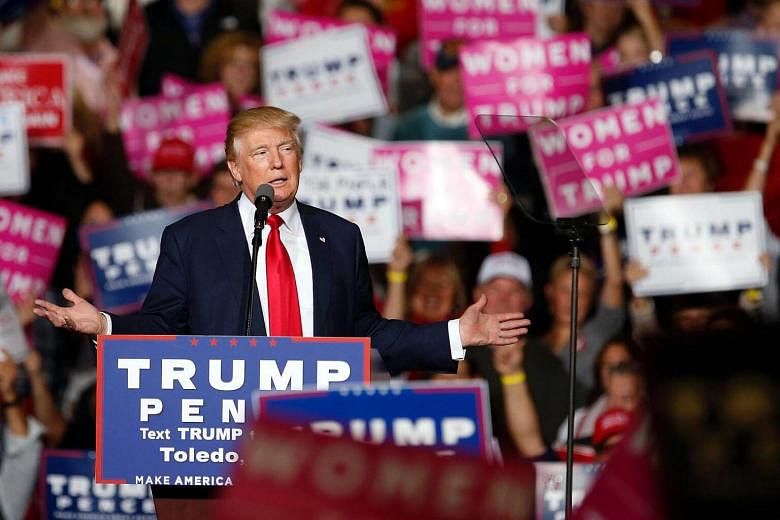NEW YORK (NYTIMES) - Republican presidential candidate Donald Trump's campaign has set off a wave of concern about its tactics after a senior campaign official was quoted describing a sophisticated "voter suppression" effort, a term that usually connotes aggressive attempts to keep people from polling places.
The anxiety among Republicans outside the Trump campaign was set off by a report in BusinessWeek in which the unidentified official used the term to describe the team's approach to three core groups of Democratic presidential nominee Hillary Clinton's supporters.
The report came after weeks of diatribes from Mr Trump questioning the basic integrity of the election. At a rally on Thursday (Oct 27) afternoon, he joked that the election should be called off and he should be crowned the winner.
"'We have three major voter suppression operations underway,' says a senior official," the BusinessWeek report said. "They're aimed at three groups Clinton needs to win overwhelmingly: idealistic white liberals, young women, and African-Americans."
"Voter suppression" often refers to activities, legal and illegal, aimed at preventing eligible voters from casting ballots, such as by passing out fliers containing the wrong date for an election.
But the BusinessWeek report went on to explain tactics that are more aptly described as efforts aimed at depressing a rival's turnout, such as informing black voters of Mrs Clinton's comment in 1994, while her husband pushed for a Bill to reduce urban crime, describing some black teenagers as "superpredators".
The report contained no examples of the more aggressive efforts that the phrase "voter suppression" usually describes.
"What it appears the quote is describing is an attempt to discourage certain demographic groups from turning out in large numbers," said Mr Jason Torchinsky, a Republican election lawyer.
"For lawyers and judges," Mr Torchinsky said, "these terms usually invoke memories of actions such as placing armed individuals outside polling places or sending letters telling legal voters that if they vote, they will go to jail."
Mr Jason Miller, a spokesman for Mr Trump, insisted that the BusinessWeek report did not accurately reflect the campaign's approach.
"Whoever described it as such either a) doesn't know what they're talking about or b) just isn't dialled in to our campaign and what Mr Trump is trying to accomplish," he said.
Mr Trump's own language about the election has raised concerns among Democrats and some Republican election lawyers.
He has repeatedly said that there was evidence that the outcome would be "rigged" and has urged his supporters to monitor urban polling places after they vote, a suggestion that some say could lead his followers to enter the sites illegally and intimidate minority voters.
His language prompted the Democratic National Committee to file court papers this week asking to extend a decades-old consent decree barring the Republican National Committee from using tactics that could prevent people from voting.
The Trump campaign is not bound by that consent decree, but his team works in tandem with the party committee.
Aides to Mrs Clinton and an official with the Democratic National Committee did not respond to requests for comment about the Trump team's remarks. A spokesman for the Justice Department declined to comment.
It is highly unusual for a campaign official to boast of using "voter suppression". Still, there is little indication that the Trump campaign is doing anything more sophisticated or aggressive than using legal, if controversial, means to try to keep Mrs Clinton's supporters from being motivated to vote.
The Trump team recently began a six-figure national ad campaign on urban radio stations, highlighting Mrs Clinton's use of the word "superpredators".
"Why would Hillary Clinton call our children superpredators?" the ad's narrator asks, adding that Mrs Clinton is "attacking our community".
"Hillary Clinton should be ashamed, using racially charged words describing black children as superpredators," the narrator says, adding that Mr Trump will rebuild the community "using our labour, our spirit, our soul".
Campaign aides for Mr Trump have talked in recent weeks about their efforts to discourage turnout for Mrs Clinton.
While his aides insist publicly that victory is in sight, the approach represents a tacit admission that Mr Trump, who has run a highly divisive and negative campaign and is viewed unfavourably by large percentages of minority and female voters, cannot expand his own vote total in a meaningful way.
The campaign's goal is to make Mrs Clinton's vulnerabilities appear so disqualifying that her supporters should never consider voting for her.
Mr Trump's attacks over the past several weeks have included suggesting that Mrs Clinton uses drugs and linking her husband, former President Bill Clinton, to a decades-old rape allegation.
A television commercial showed her coughing and stumbling and questioned whether she had the physical stamina to be president.
Much of the strategy, as described by a senior Trump aide who requested anonymity to divulge the campaign's internal plans, involves linking Mrs Clinton to her husband's history of infidelity.
More broadly, the campaign hopes it can taint her by reminding people of scandals in the couple's past. And when it can, it has tried to tie Mrs Clinton to the shaming of some of the women who say they had affairs with Mr Clinton.
The approach, the strategists believe, could be useful among millennial voters who used to support Senator Bernie Sanders of Vermont and are now unsure about Mrs Clinton.
But Democrats and some Republicans do not believe the efforts will erode Mrs Clinton's leads.

